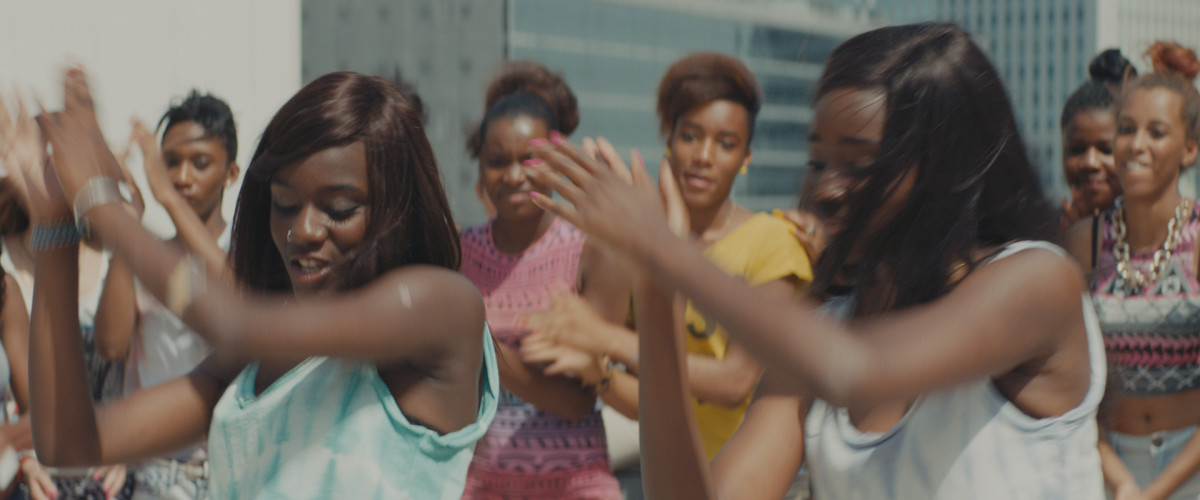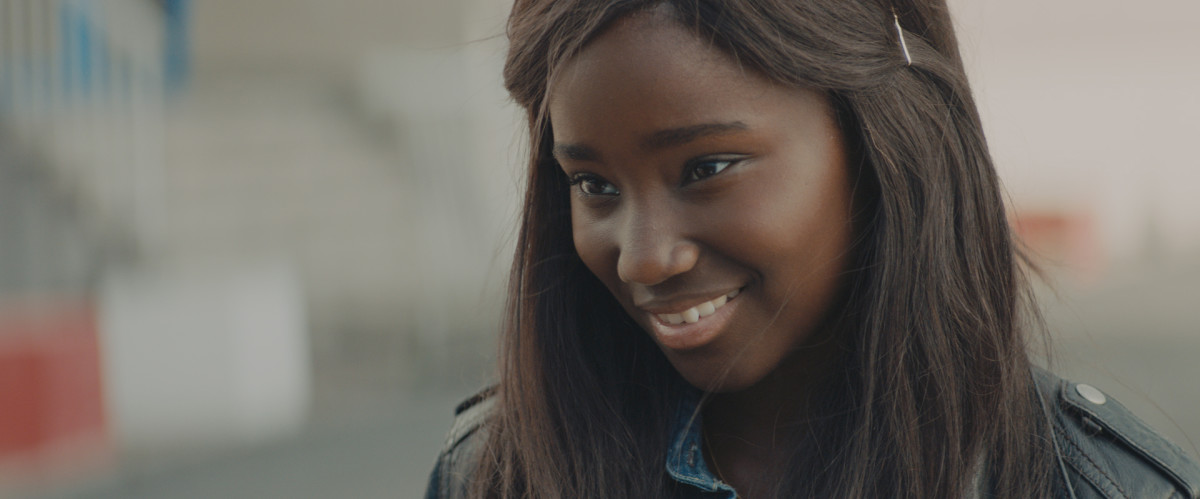Lady (Assa Sylla) and Marieme/Vic (Karidja Touré) dancing in Céline Sciamma's GIRLHOOD
Girlhood focuses on the friendship of four young women who live in the projects on the outskirts of Paris. The protagonist, Marieme (played by Karidja Touré) is at first a loner, dejected by her low grades and subsequent re-routing into vocational work, and acts as a single mother to her younger sisters while their mother works as a cleaning lady. Her older brother, Djibril, assumes the paternal role, and exerts such aggression that their home life is spliced by moments of fear; even Marieme’s crush is afraid to become intimate with her. When a magnetic group of girls—Lady, played by Assa Sylla; Adiatou, played by Lindsay Karamoh; and Fily, played by Marietou Touré—befriend her, she uncovers a resilience and courage that hastens her self-discovery. Marieme begins to understand that she can get what she wants, often in not so orthodox ways. She is given the nickname ‘Vic’, short for ‘Victoire’, or victory.
Girlhood is Sciamma’s third film, and continues her theme of teenage girls finding their way through sexual awakening and self-awareness: Waterlillies (2007) and Tomboy (2011) both confront the difficulties of female identity. The entire cast of Girlhood is black: a fact that made headlines in France, says Sciamma reluctantly. The film came about instinctively. Sciamma realized she had become fascinated with these beautiful black girls whom she would see in groups around Paris, and began to focus on them more and more, sensing that she could not be the only person who was drawn to them. The success of the film at home and abroad speaks to both the director’s insight into the psychology of nascent womanhood, and the universal nature of these difficult transitions.
Watch the trailer here.
— Alex Zafiris for Guernica
Guernica: Girlhood is primarily about friendship and selfhood, but what stood out for me was the natural charisma of these girls: their intelligence and beauty often had a masculine energy, that evolves through the film.
Céline Sciamma: It is masculine because culturally, these are virtues we attribute to men, because they are dominant. But to me, it is not masculine. It is about power. However: it is masculine, in the fact that it is the property of men. The movie is actually looking at how Marieme is trying out different hypotheses of herself, identities as outfits, like a superhero journey—what power does the outfit or costume give her. And at some point, she embraces the look of a boy to become one of the boys, after being one of the girls. She stays the same character, with the same qualities. It’s just the perceptions of others that change. I think there is a genuine will and strength that goes beyond masculine or feminine identity—regarding the character—that is alone. That’s the end of her journey, in the film: that she’s so strong, and so determined, to be herself.
Guernica: Her older brother, Djibril, is very controlling towards her and her sisters at home. Do you feel that there’s a connection between his aggression and her experimentation ?
I think that violence is always something you give back. And the most violent thing is the violence of society.
Céline Sciamma: Yes of course, everything is linked. I mean: the brother is one of the oppressions that she endures. The movie is pretty much about who is dominant, and how to become dominant. When she actually becomes powerful—when she beats up the other girl, then has sex with her boyfriend—suddenly she becomes dominant, and she becomes violent with her sister. She becomes like her brother. Its also about: When you get the power, you have the responsibility of the power. The movie is the complex journey around those questions, the fact that her intimate space is controlled by her brother, and school doesn’t allow her to be ‘normal,’ that society doesn’t want to look or live with [this kind of] character. It is a whole process of oppression that leads her to find her own way. I think that violence is always something you give back. And the most violent thing is the violence of society. Her brother is violent because he’s in charge. He kind of has to be.
Guernica: The camerawork is so intimate and minimalist. Even though it is very much the banlieue, and this particular group of girls, it also feels like it could also be anywhere, and with anyone.
Céline Sciamma: Yup. I’m trying to talk about girlhood universally, really trying to make this classic coming-of-age story, but with a very contemporary character. I wanted to get that feeling. The movie is traveling a lot, in Europe and now here, people really connect to it, it talks about them, or their country. I think that’s also what is universal about it.
In cinema, a lot of things are a matter of distance—the distance you have with your characters, where you put the camera, and so on.
Guernica: You’ve said several times that black girls are invisible in French cinema, that it took a long time to cast your actors, all of whom are unprofessional. When you found these girls, did you go back to your screenplay and change it? Did your friendships with them change the story?
Céline Sciamma: I didn’t pick them for their biographical link to the subject. When I cast them, I didn’t ask where they were from. I was trying to find girls with great acting skills. It is not about finding expertise, or documentation. I’m looking for the best performance. All four of them are from very different social backgrounds, and Kharidja has no connection at all with the projects. She lives in Paris in a good neighborhood. With her, it was a good thing, that she had a lot of distance with her character, because it actually allowed us to build it, to create it, and to work. In cinema, a lot of things are a matter of distance—the distance you have with your characters, where you put the camera, and so on. Some of the girls were more connected to that kind of lifestyle. I handed out the script, and asked them, ‘See if there’s something there that you can stand up for.’ But: it’s not about what is true, because it is fiction. It is about what the story is telling. If you can’t connect to what it is telling, then don’t do it. But they could definitely connect.
Girlhood is currently playing at Lincoln Center and Village East Cinema in New York City.

